The $60 CPU Question: AMD Athlon 200GE or Intel Pentium Gold G5400? A Review
by Ian Cutress on January 14, 2019 8:00 AM ESTCPU Performance: Encoding Tests
With the rise of streaming, vlogs, and video content as a whole, encoding and transcoding tests are becoming ever more important. Not only are more home users and gamers needing to convert video files into something more manageable, for streaming or archival purposes, but the servers that manage the output also manage around data and log files with compression and decompression. Our encoding tasks are focused around these important scenarios, with input from the community for the best implementation of real-world testing.
All of our benchmark results can also be found in our benchmark engine, Bench.
Handbrake 1.1.0: Streaming and Archival Video Transcoding
A popular open source tool, Handbrake is the anything-to-anything video conversion software that a number of people use as a reference point. The danger is always on version numbers and optimization, for example the latest versions of the software can take advantage of AVX-512 and OpenCL to accelerate certain types of transcoding and algorithms. The version we use here is a pure CPU play, with common transcoding variations.
We have split Handbrake up into several tests, using a Logitech C920 1080p60 native webcam recording (essentially a streamer recording), and convert them into two types of streaming formats and one for archival. The output settings used are:
- 720p60 at 6000 kbps constant bit rate, fast setting, high profile
- 1080p60 at 3500 kbps constant bit rate, faster setting, main profile
- 1080p60 HEVC at 3500 kbps variable bit rate, fast setting, main profile
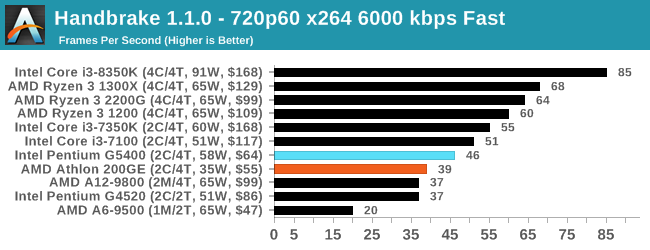
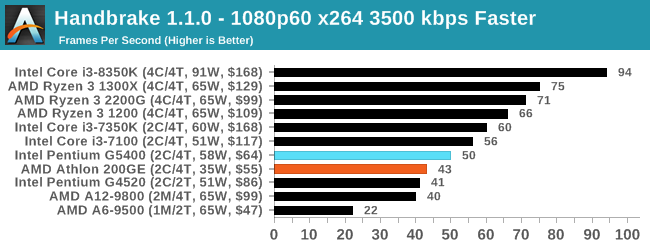
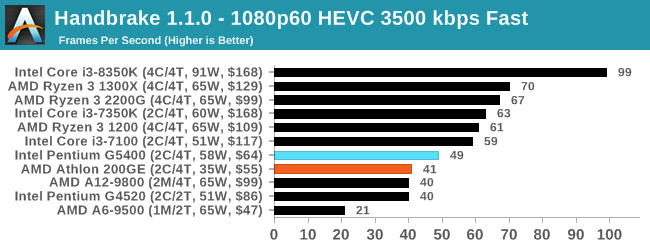
Handbrake manages to use the Pentium resources and higher frequency better, scoring about a 15% win in every circumstance.
7-zip v1805: Popular Open-Source Encoding Engine
Out of our compression/decompression tool tests, 7-zip is the most requested and comes with a built-in benchmark. For our test suite, we’ve pulled the latest version of the software and we run the benchmark from the command line, reporting the compression, decompression, and a combined score.
It is noted in this benchmark that the latest multi-die processors have very bi-modal performance between compression and decompression, performing well in one and badly in the other. There are also discussions around how the Windows Scheduler is implementing every thread. As we get more results, it will be interesting to see how this plays out.
Please note, if you plan to share out the Compression graph, please include the Decompression one. Otherwise you’re only presenting half a picture.
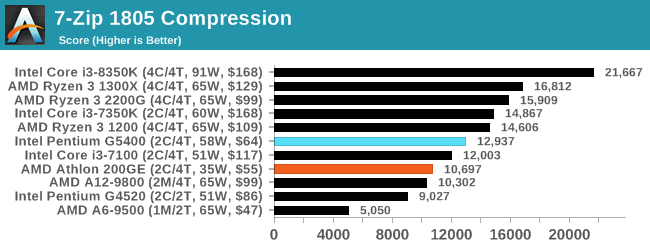
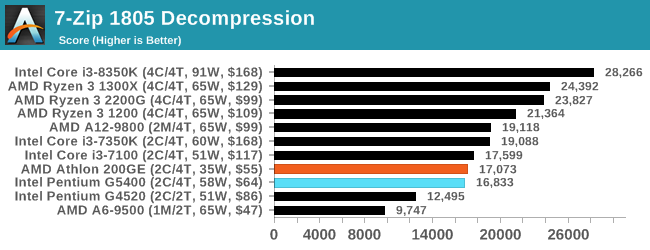
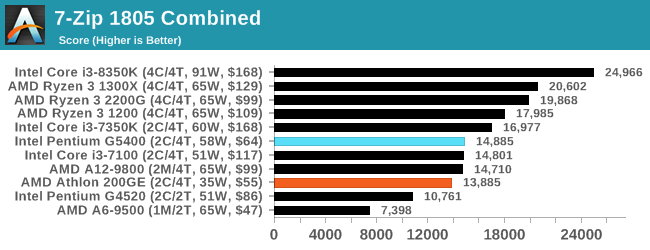
7-zip is an interesting test, given that Intel usually wins Compression but AMD wins Decompression. The same occurs here, however Intel wins the first test by a lot and AMD wins the second test by a small margin. Overall win to Intel here.
WinRAR 5.60b3: Archiving Tool
My compression tool of choice is often WinRAR, having been one of the first tools a number of my generation used over two decades ago. The interface has not changed much, although the integration with Windows right click commands is always a plus. It has no in-built test, so we run a compression over a set directory containing over thirty 60-second video files and 2000 small web-based files at a normal compression rate.
WinRAR is variable threaded but also susceptible to caching, so in our test we run it 10 times and take the average of the last five, leaving the test purely for raw CPU compute performance.
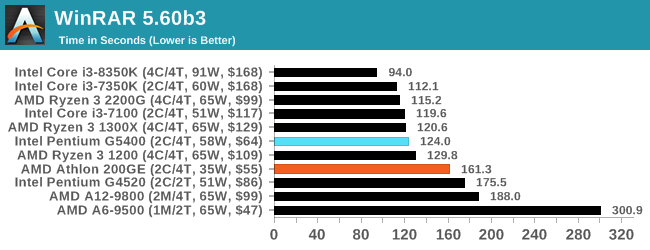
As a mixed workload that involves memory, this result would seem hard to predict given the two CPUs being tested. It ended up a clear win for Intel however – that extra core frequency in the G5400 mattered more than the main memory frequency of the 200GE.
AES Encryption: File Security
A number of platforms, particularly mobile devices, are now offering encryption by default with file systems in order to protect the contents. Windows based devices have these options as well, often applied by BitLocker or third-party software. In our AES encryption test, we used the discontinued TrueCrypt for its built-in benchmark, which tests several encryption algorithms directly in memory.
The data we take for this test is the combined AES encrypt/decrypt performance, measured in gigabytes per second. The software does use AES commands for processors that offer hardware selection, however not AVX-512.
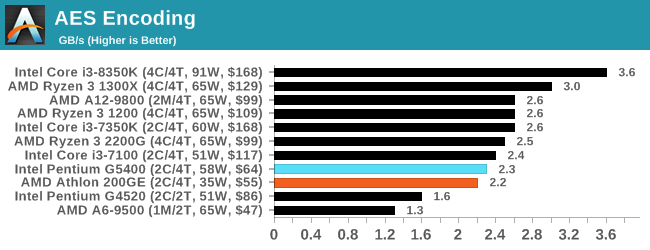










95 Comments
View All Comments
Ratman6161 - Monday, January 14, 2019 - link
One issue is though that at my favored place to buy CPU's (microcenter.com) The 2200G isn't $40 more, its only $30 more. The 200GE is $49.99 and the 2200G is $79.99. Add to that you can get a B450 motherboard for $59.99. So for just $30 more for the total system price and the fact that the 2200G/B450 combo guarantees overclocking capability, I couldn't really see going with either of the CPU's in this review.eastcoast_pete - Monday, January 14, 2019 - link
Fully agree, and, at those prices (2200G at $ 79.99, plus mobo for $59.99), it's even more a closed and shut case. Neither the Athlon nor the Pentium come anywhere near the 2200G, especially if the iGPU is "it", which is likely for a budget system. The only scenario I can see for a builder to chose the Athlon or the Pentium is if they a. are on sale, and b. if it's for one's parents or grandparents, and all they want to do is browse the web and some occasional light office work. But, even there, if one can swing the extra $30, why not get the much more capable 2200G? With the added ability to play some games, maybe you'll visit more often (:GreenReaper - Tuesday, January 15, 2019 - link
I was thinking this throughout - "wow, this review is a great advertisement for the 2200G!"Personally I'd like to wait for a chip with AV1 support, Navi and PCIe 4.0, but it seems likely that you'll be able to upgrade to all of that at a later date if you pick your motherboard right.
DominionSeraph - Monday, January 14, 2019 - link
Can you put the venerable i5 2500 in the new Bench? With used systems available for $90 it's the price/performance champion.jordanclock - Monday, January 14, 2019 - link
On the Overclocking page:"In recent weeks, motherboard manufacturers have been releasing BIOS firmware that enables overcooking on the Athlon 200GE."
I know OCing can increase temperatures, but calling it overcooking might be a little strong.
mczak - Monday, January 14, 2019 - link
Ian,I think you might want to rephrase every paragraph which has "AVX" in it. From your wording it sounds like you're surprised the pentium doesn't benefit much from the use of AVX, whereas the truth is it doesn't support AVX at all, hence even if you use avx-optimized binaries it's still going to use an sse-only path.
This is of course a reversal of the other Core chips vs. Ryzen - intel typically benefits quite a bit more from AVX code, since it actually has simd units which are physically 256bit wide, whereas Ryzen only has simd units which are 128bit wide.
GreenReaper - Tuesday, January 15, 2019 - link
I agree, I was a little confused when I saw talk of AVX for the Pentium - don't get me wrong, SSE optimizations can provide great benefits (compare 'openssl speed -evp' to 'openssl speed' on a Celeron), and probably they are used by the "optimized" path but it's not going to give the same results.As you say, "supports" is debatable on Ryzen. But even if a CPU didn't really support it on a hardware level at all (which is not the case), its use might result in improvements due to the ability to provide a microcode equivalent than is faster than the SSE-based alternatives.
silverblue - Tuesday, January 15, 2019 - link
It's not really debatable in my eyes - it may be half-speed, but there's no AVX offset - as far as I can tell - to worry about. When Zen 2 pops up, perhaps it'll have to behave more like Intel's implementation.eastcoast_pete - Tuesday, January 15, 2019 - link
Agree. After all, in the Intel universe, the absence of AVX is a key differentiator between the Pentium and the core i3; if you want hardware-supported AVX extensions, you have to fork over the extra $$$ and get at least the entry-level core chip.kkilobyte - Monday, January 14, 2019 - link
I'd like to know where one would find the G5400 at 60$, or even at the same price as the 200GE.I don't seem to be able to find the G5400 in Europe for less than 75€. On the other hand, I can get a 2000GE at 55-60€.
For example, Materiel.net - one of the most popular online shops in France and Belgium, has the cheapest Intel i3, the G4900, at 67.95€, while the 200GE is 57.95€. And the G5400? They list it as 'out of stock', at more than 100€ (!)
If both where at the same price, indeed, the Intel CPU would be more interesting. But if it's either unavailable or 20-50% more than the price given in the article, what's the point?